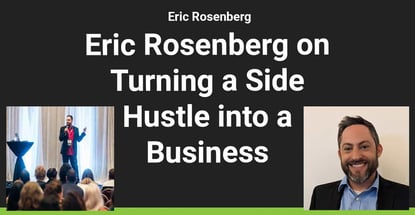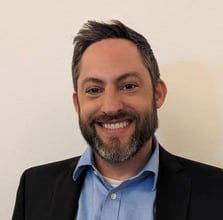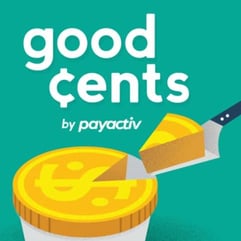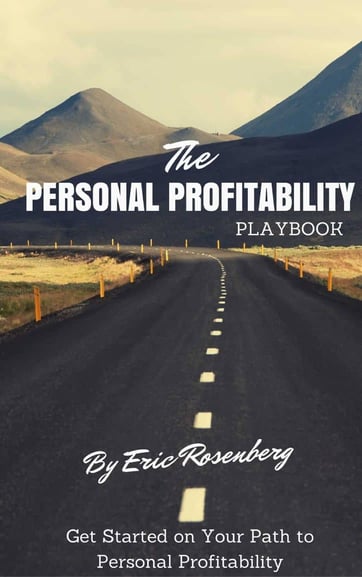
Our experts and industry insiders blog the latest news, studies and current events from inside the credit card industry. Our articles follow strict editorial guidelines.
In a Nutshell: While his childhood pals dreamed of being sports stars, Eric Rosenberg aspired to appear on the cover of Fortune magazine. Predictably, an MBA followed. Later, as a young husband and father, he took a gamble and left his corporate job to strike out as an independent blogger, freelance writer and speaker, and finance media expert. Eric’s career as a serial solo entrepreneur inspires his audience to find what works for them to live their best lives, achieve financial independence, and make their dreams come true.
Some people are born into finance careers. Eric Rosenberg was preoccupied with entrepreneurship beginning in grade school. Growing up, his family owned a video store where Rosenberg helped out on weekends and holidays. At Boy Scout camp, he held many roles over seven years, including as the director of the camp’s retail stores and as the office manager.
Rosenberg was fascinated when his grandfather, a business school professor, would take him to a local bank branch to check stocks on a monochrome terminal. His grandfather loved to quiz him on stock symbols, and Eric marveled at the concept of owning bits and pieces of a company.

Not surprisingly, these early interests led to a business school education. In high school, Rosenberg signed up for business classes instead of art or music and earned a finance degree and MBA in college before starting a series of banking, corporate finance, and accounting jobs.
The story doesn’t end there as it would for most people. Rosenberg had started a personal finance blog during downtime at Boy Scout camp. As a person who paid down personal debt responsibly, he realized he had many positive things to say about money and lifestyle management.
Rosenberg married and he and his wife had a daughter. One day, he found himself leaving for the office before his daughter woke up and returning after she had gone to sleep. That made him realize there was more to life than working with spreadsheets in a cubicle. He started a personal finance blog after leaving his for job after college as a bank manager, which became Personal Profitability, his internet home base on the road to financial independence.
That’s not the end of the story, either. Rosenberg has leveraged his blogging success to build a lucrative solo entrepreneurial career as a freelance writer and speaker and finance media expert. His youthful enthusiasm for his subject has never gone away.
“For the last month and a half, I’ve been working hard on my new app, Freelancer Dashboard,” Rosenberg said. “Hopefully, it’ll be the next phase in my entrepreneurial evolution.”
How to Realize Your Entrepreneurial Ambitions
Rosenberg’s career illustrates the advantages of starting small with achievable goals and solving problems to reach higher levels. One might even think of his trajectory as beginning with a side hustle that he turned into a successful business.
That’s why his thoughts on side hustles are valuable to readers, listeners, and viewers who find his content on Personal Profitability. As a finance media expert, Rosenberg also hosts the Good Cents Podcast by Payactiv. He’s a frequent speaker and media personality with freelance content all over the web.

Rosenberg said people can take several paths when planning a side hustle. What has worked best for him is starting a service business. Beginning a product business can be very expensive. Offering a valuable service online provides a chance to make more money in less time.
“If you have the right skills, you can create something online without a massive expense or time commitment,” Rosenberg said.
Keeping things simple works best, he argues.
“You only need a few things to start a business: a product or service to sell, someone willing to buy it, and a way to deliver it,” he said. “If you can do those three things, you’re in business.”
The next step, growing a side hustle into something more, poses more of a challenge. Increasing a side-hustle income from a trickle to a deluge requires thinking entrepreneurially and setting up separate bank accounts and credit cards to track earnings and expenses. If you do the math, you can chart what you need to do to replace your current income.
“Put on your financial analyst hat, read a couple of personal finance books, and learn the basics of an income statement and a balance sheet,” Rosenberg said. “Then, find what works and lean into that.”
Learn to Use Your Finances to Live the Lifestyle You Want
None of that is possible without sticking to personal financial fundamentals, as Rosenberg has since he started paying his way as an adult.
As an early consumer of financial blog content, the horror stories of massive debt and dysfunction he read motivated him to put his contrasting story out there. Rosenberg left undergraduate school debt-free, for example, and has quickly paid off graduate student loans and auto loans and avoided spending counterproductively.
Those ongoing habits form the basis of a philosophy anyone can use to improve their finances. There’s nothing earth-shattering about them.

Many blame poor finances for their inability to live the life they want. Rosenberg turns that mindset around and advocates learning how to use money to live the life you’re aiming for.
“I want to grow my wealth over time,” Rosenberg said. “I don’t want to be in debt, I don’t want to pay interest, and I want to use my money to improve my life.”
That might mean cutting back on one expense you care less about to funnel money into something you care more about. In other words, if you spend too much on a daily coffee or work lunch to save for a dream vacation, it’s time to decide which is most important.
Go for big wins on significant expenses. Rosenberg never spends too much on personal transportation, for example, keeping family cars for at least 10 years and avoiding extravagant loan payments. A modest home and mortgage payment is better than overtaxing your budget. Shopping around for insurance and other necessary products — and being an informed consumer in general — make budgeting and saving up for milestone trips or other desirables far more feasible.
“If you take the time to think through your financial future and make better choices to help your long-term finances, future you will thank you,” Rosenberg said.
Find What Works to Build Financial Independence
Rosenberg and his family live those values daily. Based near in-laws in Ventura, California, he worked out of a converted bedroom in the family home for years before his children started clamoring for more room. He then built a backyard office shed, where he works most of the time today.
He occasionally works in a local coffee shop, but not enough to threaten the family’s financial plan.

Rosenberg presents his services as a freelance writer, event speaker, and finance/marketing consultant through his website at ericrosenberg.com. He still runs Personal Profitability with up-to-date blog content, archival podcasts, and YouTube content, including a Personal Profitability series called “2 Minute Money.”
He has a small team that helps him work with businesses of all sizes to map content and marketing strategies, create financial articles and blog posts, and prepare e-books and whitepapers.
He continues to work on Freelancer Dashboard, his new app project for freelancers to track assignments and invoicing.
Freelancer Dashboard was nascent when this article went to press in early 2024, and it had no payment system and some design inconsistencies. It’s a work in progress.
“When I told other freelancers how I automated my invoicing, they told me they’d pay to have me set that up for them,” Rosenberg said. “So I decided to build something to work for everyone.”
He remembers discussing his career with his wife’s uncle, a successful retired CEO.
“I asked him the secret to success, and he told me I should make or sell something, so I quit my job to blog,” Rosenberg said. “Years later, I asked him what I should do next, and he told me I should make it scale. I’m working on that now.”



![How to Build Business Credit: 7 Expert Tips to Build Credit Fast ([updated_month_year]) How to Build Business Credit: 7 Expert Tips to Build Credit Fast ([updated_month_year])](https://www.cardrates.com/images/uploads/2017/02/how-to-build-business-credit1.png?width=158&height=120&fit=crop)
![How Do Credit Cards Work? Expert’s Guide ([updated_month_year]) How Do Credit Cards Work? Expert’s Guide ([updated_month_year])](https://www.cardrates.com/images/uploads/2017/04/how-do-credit-cards-work.jpg?width=158&height=120&fit=crop)
![9 Best Airline Rewards Programs: Expert Guide ([updated_month_year]) 9 Best Airline Rewards Programs: Expert Guide ([updated_month_year])](https://www.cardrates.com/images/uploads/2017/10/airline.png?width=158&height=120&fit=crop)
![9 Best Ways to Pay Off Credit Card Debt (From Expert Beverly Harzog) ([updated_month_year]) 9 Best Ways to Pay Off Credit Card Debt (From Expert Beverly Harzog) ([updated_month_year])](https://www.cardrates.com/images/uploads/2017/10/Beverly-9Best.jpg?width=158&height=120&fit=crop)
![How to Sign Up For a Credit Card: Expert Guide ([updated_month_year]) How to Sign Up For a Credit Card: Expert Guide ([updated_month_year])](https://www.cardrates.com/images/uploads/2017/12/signup2.png?width=158&height=120&fit=crop)
![What Credit Card is Best for Me? Expert Guide ([updated_month_year]) What Credit Card is Best for Me? Expert Guide ([updated_month_year])](https://www.cardrates.com/images/uploads/2018/03/me.png?width=158&height=120&fit=crop)
![9 Expert Solutions: Build Credit Without a Credit Card ([updated_month_year]) 9 Expert Solutions: Build Credit Without a Credit Card ([updated_month_year])](https://www.cardrates.com/images/uploads/2018/05/without2.png?width=158&height=120&fit=crop)